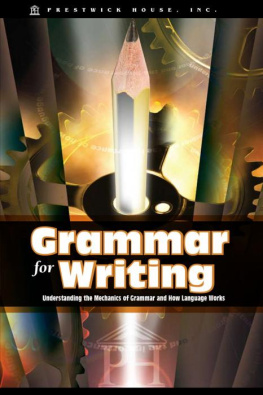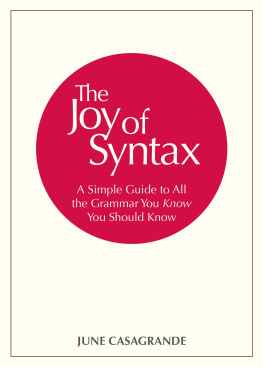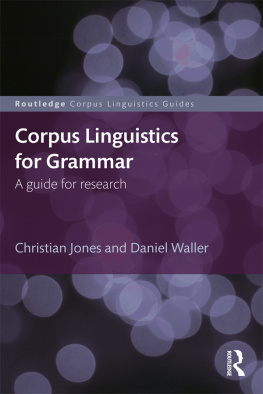Copyright 2017 Fordham University Press
All rights reserved. No part of this publication may be reproduced, stored in a retrieval system, or transmitted in any form or by any meanselectronic, mechanical, photocopy, recording, or any otherexcept for brief quotations in printed reviews, without the prior permission of the publisher.
Fordham University Press has no responsibility for the persistence or accuracy of URLs for external or third-party Internet websites referred to in this publication and does not guarantee that any content on such websites is, or will remain, accurate or appropriate.
Fordham University Press also publishes its books in a variety of electronic
formats. Some content that appears in print may not be available in electronic books.
Visit us online at www.fordhampress.com.
Library of Congress Cataloging-in-Publication
Data available online at http://catalog.loc.gov.
Printed in the United States of America
19 18 17 5 4 3 2 1
First edition
The structure of this book is designed to give readers what they need in order to make sense of two strange and intriguing texts composed by creative writers who were great scholars, devoted teachers, and spiritual guides eager to help seekers as they journeyed toward God. Hoping to reach readers who are keenly interested in the practice of comparative theology, language and its ultimate significance, spirituality and its history, medieval religious culture and its texts, plus literary theory and its applicability to theology, I have assumed no particular expertise or background. I hope equally to entice students of Islamic thought to read about Gerson and enter his world as to entice students of Christian thought to read about Qushayr and enter his world.
The introductory chapter poses the question at the heart of this inquiry, namely, the theological significance of the queer literary genre of Qushayrs Grammar of Hearts and Gersons Moralized Grammar . Thematizing spiritual grammar, the Introduction contrasts this hybrid genre with other writings that intermix the spiritual and the grammatical or the religious and the linguistic. It is here that I first begin developing a description of spiritual grammar as a genre based on the metaphor of the self embedded in the grammatical structures of spiritual reality. Through their distinctive mlange of grammatical and religious genres, spiritual grammar blatantly violates what Derrida calls the law of genre. The non-invisibility of the genre of such texts makes their stage unmissable, their performance unmistakable, and calls into question the genres of theology and the genders of Christian and Muslim believersframes of knowledge and being that are commonly transparent and invisible. In this way, the genre of spiritual grammar creates a space for the reader to become a certain kind of person, in a certain kind of world.
offers the most detailed comparison to date of the medieval Arab Islamic and Latin Christian diglossic sociolinguistic situations, where grammar was inextricable from education and religion, and where Arabic fu and Latin were both father tongues holding considerable prestige and power. In both Qushayrs eleventh-century Persia and Gersons fifteenth-century France, a vernacular mother tongue was on the historical verge of challenging the societal father tongue for dominance in literary and intellectual realms. The two medieval masters both used the power of the father languages of Arabic and Latin to give force to their spiritual grammars as part of a pedagogical project akin to what Michel Foucault would call forming the self and constructing the subject.
demonstrates how Jean Gerson used a number of genres to engender saintly subjectivities. His texts are different kinds of genre performances coming out of his various positions as university professor, master of theology, preacher, and speaker in the public sphere. The sermon, which was the central genre of religious literature in the medieval West, and the tract, a new genre in early-fifteenth-century French society, provide specific examples of Gersons adaptive versatility as a writer and theologian. In his Sermon Against Gluttony , Gerson donned the illustrious gown of the University master and preached in the father tongue. In his French sermon, Videmus nunc , Gerson put on the robe of the parish priest and evangelized in the mother tongue. In his tract De pollutione nocturna , Gerson used an innovative, streamlined genre to write in the voice of a sexual theologian, addressing a pressing moral question for clerics of his day.
is a primer in spiritual grammar. Here I perform a close reading of Gersons Moralized Grammar (Donatus moralizatus) . This theological and literary exposition initiates the reader into how this unusual texts hybrid genre works. With appreciation of the authors pastoral agenda and the theological content of the text, this interpretation of Moralized Grammar illuminates the considerable skill involved in transforming into a sermonic moral catechism the grammatical primer written by Aelius Donatus (fl. 350 C.E. ), which was foundational to education for 1,000 years in the West. This chapter argues that in Moralized Grammar Gerson accomplished a feat of literary creativity for the purpose of crafting a synopsis of the Christian moral and spiritual life that would have been extraordinarily memorable for the growing class of literate Christians of his time.
As examines the use of literary genre by Qushayr. The theme of dhikr that is, the ritual recitation of the names of Godprovides a red thread to trace throughout a range of genres where the intersection of spiritual and linguistic concerns is particularly evident in Qushayrs thought. This chapter examines his Risla , which is Qushayrs most well-known work and the handbook used for centuries to introduce students to Sufism; La if al-ishrt , his work of Quranic exegesis; Shar asm Allh al-usn , his commentary on the names of God; and a work of Qushayrs on spiritual direction, Tartb al-sulk f arq Allh . Besides analyzing how Qushayr made use of genre in the Sufi literature he produced, this chapter provides familiarity with Qushayrs scholarly concerns, historical milieu, and authorial character so as to prepare for a close reading of The Grammar of Hearts .











